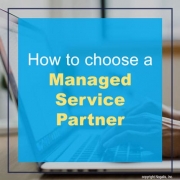How to choose a Managed Service Partner
In today’s fast changing IT landscape, you need a managed service provider (MSP) that understands your needs and whose business model is aligned with your organization. Keep in mind the following areas when choosing a managed service provider for your business.
- Specific application expertise: There are thousands of managed service providers within the US. Many of them claim to work with dozens of applications. It is important however that your main applications are properly supported, and the expertise of your MSP team exceeds and enhances that of your own internal team. For that reason, we focus mainly on Infor, Lawson and Kronos applications and some of the ancillary applications that are usually installed with them (MHC, BSI, API, ImageNow, Ascend …). Make sure that your MSP partner is in good standing with your software vendor and is certified to deliver services related to those applications.
- Industry specific knowledge: Every industry has its own special challenges and choosing a managed service partner who has worked with clients in your industry can make a big difference in your level of success. An experienced MSP can also bring best practices from others in your vertical to help you be more efficient.
- Client references: The best indicator of the quality of an MSP is what their clients have to say about them. Check reviews and ask to speak to their customers before you select an MSP.
- State-side availability: Many of our clients find it imperative that our staff is not outsourced to foreign countries and all the work is performed state-side. If this is important to your organization, ensure that your MSP partner has a presence where you do your business and will not be impacted by geo-political issues that might otherwise interrupt their services.
- Methods of engagement: You need to find out ahead of time how your users can engage with your MSP. Some MSPs employ a cumbersome ticketing process that can add hours if not days to the resolution of each issue. We have long adopted a policy of working within whatever ticketing system our clients are already working with so as to remove any friction from resolving issues. We also encourage customers to call or emails us directly if they feel like that will facilitate faster resolution. Be sure to understand the way your MSP works before committing to long term relationships.
- Avoid long term commitments: Committing to a service provider is a big business decision that can impact your organization significantly. It is always advised to insist on a short-term commitment whenever possible. We don’t lock our clients into long term contracts for this very reason. In reality, if a customer wants to change service providers, it doesn’t make sense to force them to stay, but many MSPs still insist on multi-year contracts in order to break even with long and expensive sales cycles and hefty commissions.



